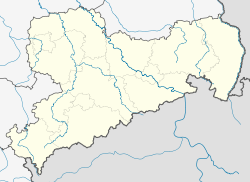Riesa
Riesa | |
|---|---|
 Riesa with the Trinitatis Church near the Elbe River in July 2008 | |
 Coat of arms | |
show Location of Riesa within Meißen district | |
 Riesa | |
| Coordinates: 51°18′29″N 13°17′38″E / 51.30806°N 13.29389°ECoordinates: 51°18′29″N 13°17′38″E / 51.30806°N 13.29389°E | |
| Country | Germany |
| State | Saxony |
| District | Meißen |
| Subdivisions | 16 |
| Government | |
| • Mayor (2021–28) | Marco Müller[1] (CDU) |
| Area | |
| • Total | 58.91 km2 (22.75 sq mi) |
| Elevation | 109 m (358 ft) |
| Population (2020-12-31)[2] | |
| • Total | 29,256 |
| • Density | 500/km2 (1,300/sq mi) |
| Time zone | UTC+01:00 (CET) |
| • Summer (DST) | UTC+02:00 (CEST) |
| Postal codes | 01587, 01589, 01591, 01594 |
| Dialling codes | 03525 |
| Vehicle registration | MEI, GRH, RG, RIE |
| Website | www.riesa.de |
Riesa is a town in the district of Meißen in the Free State of Saxony, Germany. It is located on the Elbe River, approximately 40 kilometres (25 miles) northwest of Dresden.
History[]
The name Riesa is derived from Slavic Riezowe. This name, romanised as "Rezoa", appears first in October 1119 in a document from Pope Callixtus II.
The world's first 110 kV power line was installed between Riesa and Lauchhammer in 1912. Between 1952 and 1994, Riesa was the seat of a district.
During the 1980s, Riesa was the headquarters of the Group of Soviet Forces in Germany's 9th Tank Division.
Population history[]
The town grew from the start of the 20th century due to industrialisation. The population declined after German Reunification in 1989. The local steel works shut and the population fell from 52,000 to 31,000.
|
|
Sights[]


Riesa has a 25 m tall, 234 tonne, cast-iron (GGG 40) sculpture of an oak trunk, named Elbquelle, which means source of the Elbe, by Jörg Immendorff, erected in 1999. Local folk call the sculpture by many other names, most notably "Rostige Eiche", which means "Rusty Oak".
In Riesa there are two notable churches. The minster St. Marien was built in 1261 as an addition to the Benedictine Abbey. The was completed in 1897.
Culture[]
Riesa is well known locally for its pasta, which is produced at Teigwaren Riesa GmbH. Another symbol of Riesa are the Riesaer Zündhölzer, the matches which were traditionally manufactured there.
The steel production in Riesa is also well known.
Sport[]
Riesa has a football club, BSG Stahl Riesa. The club's crest is blue and white, as are the club colours. They play now in the Landesliga Sachsen (6th tier).
Riesa is known locally for the SACHSENarena, a large hall which hosted the European Sumo Wrestling Championship in October 2003 and the World Sumo Wrestling Championship in October 2004.
Twin towns – sister cities[]
 Głogów, Poland
Głogów, Poland Lonato del Garda, Italy
Lonato del Garda, Italy Mannheim, Germany
Mannheim, Germany Rotherham, England, United Kingdom
Rotherham, England, United Kingdom Sandy, United States
Sandy, United States Villerupt, France
Villerupt, France Wuzhong (Suzhou), China
Wuzhong (Suzhou), China
Transport[]

Riesa railway station is located north of the town's centre, it offers both regional and long-distance services.
Riesa is located on Bundesstraße 169, which ensures access to federal motorways A 14 (close to Döbeln, approx. 25 km) and A 13 (close to Ruhland, approx. 50 km).
Notable people[]

- Adolph von Carlowitz (1858–1928), Saxon officer, general of the infantry and war minister
- Johannes Müller (1864–1949), theologian
- Rolf Moebius (1915–2004), actor
- Dieter Noll (1927–2008), writer
- Jürgen Schmieder (born 1952), politician
- Monika Zehrt (born 1952), athlete
- Heiko Peschke (born 1963), footballer
- Ulf Kirsten (born 1965), footballer
- Rüdiger Heinze (born 1971), film producer and screenwriter
- Maximilian Arnold (born 1994), footballer
Associated with the town[]
- Walter Fritzsch (1920–1997), football coach
- Wolfgang Lischke (born 1947), footballer
- Peter Kotte (born 1954), footballer
- Harald Czudaj (born 1963), bobsledder
- Ralf Hauptmann (born 1968), footballer
References[]
- ^ Wahlergebnisse 2021, Freistaat Sachsen, accessed 10 July 2021.
- ^ "Bevölkerung des Freistaates Sachsen nach Gemeinden am 31. Dezember 2020". Statistisches Landesamt des Freistaates Sachsen (in German). June 2021.
- ^ "Partnerstädte". riesa.de (in German). Riesa. Retrieved 2021-03-15.
External links[]
- Official website
- Riesa tourism site
- Official Web site of Stahl Riesa Footballclub
 Texts on Wikisource:
Texts on Wikisource:
- "Riesa". Encyclopædia Britannica (11th ed.). 1911.
- "Riesa". New International Encyclopedia. 1905.
- Towns in Saxony
- Riesa
- Meissen (district)
- Kingdom of Saxony
- Bezirk Dresden


